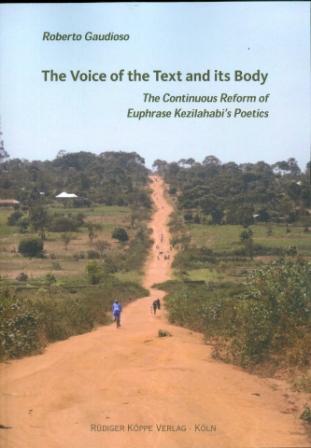


The aim of this study is to provide a critical reading of the three poetic collections written in Swahili by Euphrase Kezilahabi (13 April 1944 – 9 January 2020). The author is not trying to avoid all the complexities of his poetics and thought, but rather seeks to cope with them and reflect upon them.
A simplification of Kezilahabi’s texts or a mere descriptive analysis of his poems would expose the author’s study of his poetics to textual objectification, i.e. regarding the text as an object, a finished and closed product. In agreement with Kezilahabi, Gaudioso believes that objectification should be kept out of literary interpretation. To all his questions, Gaudioso will add new ones, connections, implications, rather than solving them. Trying to be as clear as possible, Gaudioso will compare Kezilahabi with other writers in order to delineate the poetics of Kezilahabi not only in the light of Swahili literature, but also in its interconnections.
In the second chapter the author argues on the suitability of the comparative analysis and the usefulness of analogy in understanding. This approach, even though it multiplies the focuses, takes the text, texts and textuality as the central point of the analysis.
The following two reasons are used for the Gaudioso’s analogical approach:
1. the aim of his thesis is not to compare Kezilahabi with a particular author but to focus on him;
2. delineating his poetics using comparative analysis as a tool of investigation by analogy as defined in the second chapter.
The potential reader of the present work is a recipient of Kezilahabi’s poetry, which is neither easy nor clear, therefore, Gaudioso’s study does not substitute a plain “explanation” for a direct reading of the original texts of Kezilahabi. According to the author the academic works do not come before the (and sometimes in substitution of) reading of a text that will be analysed, but after their reading. Otherwise, the academic work would be not a service to literature, to word artistry, or to potential readers of a text, but a damage.
Here you will find further editions and analyses of African verbal art:
En resumen, el estudio de Gaudioso sobre la poesía de Kezilahabi es una obra valiosa que proporciona, tanto al neófito como al lector experimentado de la literatura Kezilahabi y swahili en general, un punto de entrada a la complejidad y la belleza manifiesta del pensamiento y la creatividad de Kezilahabi. Para los comparatistas es un trabajo igualmente importante en términos de sus técnicas de estudio comparativo a lo largo de una variedad de trayectorias temáticas de investigación.
Aaron Louis Rosenberg in Estudios de Asia y África, 2022/1, 201-204
In conclusion, on the account of its well-informed theoretical grounding, original critical approach to Kezilahabi’s poetry and close-reading textual analysis, this book represents valuable reading for literary researchers investigating the works of Euphrase Kezilahabi and for scholars interested in new critical approaches to Swahili poetry.
Flavia Aiello in Swahili Forum, 27/2020, v-vii
I conclude by coming back to what I asserted at the beginning — that this work has been published at exactly the right time. The literary trend of materialistic freedom, that “unicum” which besides Kezilahabi involved authors such as Topan and Hussein, is now at its end. Kezilahabi died on 9 January 2020; Hussein has declared his retirement from writing; Topan’s last play, “Siri”, dates back to 2000, and since then he has received almost no interest from scholars. Not enough attention has been paid to this period of Swahili literature; it is time to come back to these works, to read them almost a half century after their publication, and to shed light on their aesthetics, together with their authors as far as they are still living. I hope that “The Voice of the Text and its Body” will push the research interests of many in this direction.
Emiliano Minerba in Eastern African Literary and Cultural Studies, Feb 2022, 1-6
© 2026 by Rüdiger Köppe Verlag – www.koeppe.de